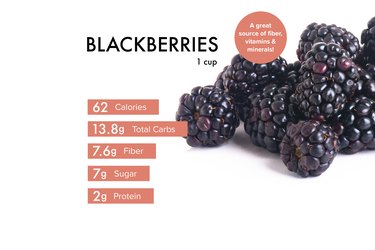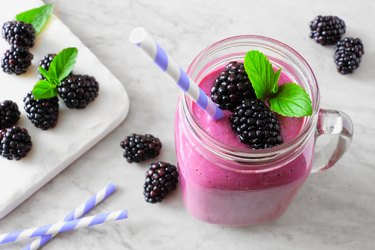
Blackberries are power-packed with vitamins, minerals and antioxidants and are often enjoyed fresh, as a jam or in baked goods.
They're closely related to raspberries and are known as "aggregate fruits" because they're made from multiple flower ovaries that combine to make one fruit.
Video of the Day
Video of the Day
Blackberries are found primarily in northern temperate regions, and wild blackberries are abundant in North America and the Pacific and Atlantic coastlines.
Blackberries Nutrition Facts
One cup of blackberries is equal to a single serving. One cup of blackberries contains:
- Calories: 62
- Total fat: 0.7 g
- Cholesterol: 0 mg
- Sodium: 1.4 mg
- Total carbs: 13.8 g
- Dietary fiber: 7.6 g
- Sugar: 7 g
- Added sugar: 0 g
- Protein: 2 g
Blackberries Macros
- Total fat: One cup of blackberries has 0.7 grams of total fat, which includes 0.4 grams polyunsaturated fat, 0.07 grams monounsaturated fat, 0 grams saturated fat and 0 grams trans fat.
- Carbohydrates: One cup serving of blackberries has 13.8 grams of carbohydrates, which includes 7.6 grams of fiber and 7 grams of naturally occurring sugar.
- Protein: A one-cup serving of blackberries has 2 grams of protein.
Vitamins, Minerals and Other Micronutrients
- Manganese: 40% of your Daily Value (DV)
- Vitamin C: 34% DV
- Copper: 26% DV
- Vitamin K: 24% DV
- Vitamin E: 11% DV
- Folate: 9% DV
- Pantothenic Acid (B5): 8% DV
- Magnesium: 7% DV
- Zinc: 7% DV
- Niacin (B3): 6% DV
- Iron: 5% DV
- Potassium: 5% DV
- Vitamin B6: 3% DV
- Calcium: 3% DV
- Phosphorous: 3% DV
- Riboflavin (B2): 3% DV
- One cup of blackberries is not a significant source of thiamin (2% DV), selenium (1% DV), choline (2% DV) or vitamin A (2% DV).
Blackberries vs. Other Types of Berries
Per 1 cup serving | ||||
|---|---|---|---|---|
Calories | 62 | 53 | 64 | 84 |
Total Carbs | 13.8 g | 12.7 g | 14.7 g | 21.4 g |
Sugar | 7 g | 8.1 g | 5.4 g | 14.7 g |
Fiber | 7.6 g | 3.3 g | 8 g | 3.6 g |
Protein | 2 g | 1.1 g | 1.5 g | 1.1 g |
Health Benefits of Blackberries
Like other berries, blackberries have a rich and varied nutrient profile. Blackberries contain a wide variety of vitamins, minerals and antioxidants.
1. Blackberries Can Help With Weight Management
Blackberries are an excellent source of dietary fiber, which supports healthy weight-loss goals and helps maintain a healthy weight.
In fact, adding more fiber to your diet is linked to lower body weight, according to an April 2013 study in Nutrients.
Dietary fiber increases fecal bulk, helping keep you full and your intestinal tract running smoothly. Fiber can also help improve glucose tolerance, increase insulin sensitivity and reduce levels of blood cholesterol levels and triglycerides.
Boosting your fiber intake to 30 grams per day is an effective approach to weight loss, as shown in a February 2015 Annals of Internal Medicine study.
What's more, eating a plant-forward diet full of whole fruits (such as blackberries) as well as vegetables, legumes and nuts has been shown to be an effective strategy for treating obesity, according to a November 2018 study in Nutrition and Diabetes.
2. The Minerals in Blackberries Can Support Healthy Bones
Blackberries contain minerals associated with good bone health, including manganese, copper, zinc, magnesium and vitamin K.
These minerals work together to support bone homeostasis. Manganese helps with bone metabolism, assisting in the prevention of osteoporosis, according to the National Institutes of Health (NIH) while copper and zinc help with bone formation and overall structure, per American Bone Health.
The majority of magnesium in our bodies is found in our bones and functions closely with calcium and phosphorous. Vitamin K plays a key role in bone metabolism and is essential for bone health, according to the NIH.
3. Blackberries Pack Powerful Antioxidant Properties
Berries contain a number of health-promoting nutrients, such as phytochemicals, manganese and vitamin C, which have been found to be therapeutic for a variety of gastrointestinal and immune-related illnesses, according to the October 2017 issue of Nutrition Reviews.
Manganese helps to scavenge reactive oxygen species (ROS), which are known as free radicals, and help the body deal with oxidative stress, according to an April 2018 report in Oxidative Medicine and Cellular Longevity. Blackberries contain 40 percent of your DV of this mineral.
Meanwhile, vitamin C helps limit the damaging effects of free radicals through its antioxidant activity, all of which have a positive effect on the gastrointestinal tract and immunity, according to the NIH.
Blackberries Health Risks
There are currently no confirmed or known food allergies or drug interactions related to blackberries. Be sure to discuss any medication and food interactions with your health professional.

Blackberry Preparation and Useful Tips
Summer is blackberry season and when the plump fruits have a rich, deep color, a sweet aroma and are most likely to taste best.
Avoid blackberries that still have a hull attached in the center, indicating they were picked before fully ripening. Packaged blackberries should not be packed in too tightly, have stains or a lot of moisture or look crushed or moldy. You can also find frozen blackberries year-round in the freezer section of your local grocery store.
When preparing blackberries, follow these cleaning tips to protect the delicate fruits from injury:
- To clean, fill a bowl with cool water and add the berries, gently swirling, then pour them into a colander.
- Alternatively, you may carefully place blackberries in a colander and wash them gently using light pressure from the faucet.
Remove any crushed berries or they will cause the others to mold quickly. To prevent crushing and spoilage, you may want to transfer them from their original container to a single layer in a shallow glass dish covered with a damp paper towel.
Tip
Blackberries are extremely perishable and are best eaten within two days of purchasing. Never wash berries before storing them and be sure to place them in the refrigerator as soon as possible.
How to Freeze Blackberries
If you can't eat the blackberries within two days, you can easily freeze them.
- Wash and pat them dry with a paper towel.
- Spread them on a baking sheet in a single layer.
- Place the baking sheet into the freezer and freeze until firm.
- Transfer the frozen blackberries to a resealable freezer bag or airtight container. Frozen berries should stay fresh for up to one year.
Creative Ways to Use Blackberries
Blackberries are delicious raw or cooked. Here are some quick serving ideas.
- Eat whole as a snack or dessert, add to salad or use as a topping for pancakes and waffles.
- Add to yogurt, oatmeal or smoothies.
- Make into jam.
- Use as filling for a pie.
- Add to cake or muffin batter.
- Cook them with some water, lemon juice, lemon zest and honey and use as a topping for ice cream or something savory like roast meat or poultry.
- Encyclopaedia Britannica: “Blackberry Fruit”
- My Food Data: “Blackberries”
- My Food Data: “Strawberries”
- My Food Data: “Raspberries”
- My Food Data: Blueberries”
- Nutrition and Diabetes: “A plant-based diet in overweight individuals in a 16-week randomized clinical trial: metabolic benefits of plant protein”
- Nutrients: “Fiber and Prebiotics: Mechanisms and Health Benefits”
- Annals of Internal Medicine: “Single-Component Versus Multicomponent Dietary Goals for the Metabolic Syndrome: A Randomized Trial”
- NIH: “Fact Sheet for Health Professionals: Manganese”
- American Bone Health: “Minerals for Bone Health”
- Nutrition Reviews: “Review of the health effects of berries and their phytochemicals on the digestive and immune systems”
- Oxidative Medicine and Cellular Longevity: “The Essential Element Manganese, Oxidative Stress, and Metabolic Diseases: Links and Interactions”
- NIH: “Fact Sheet for Health Professionals: vitamin C”